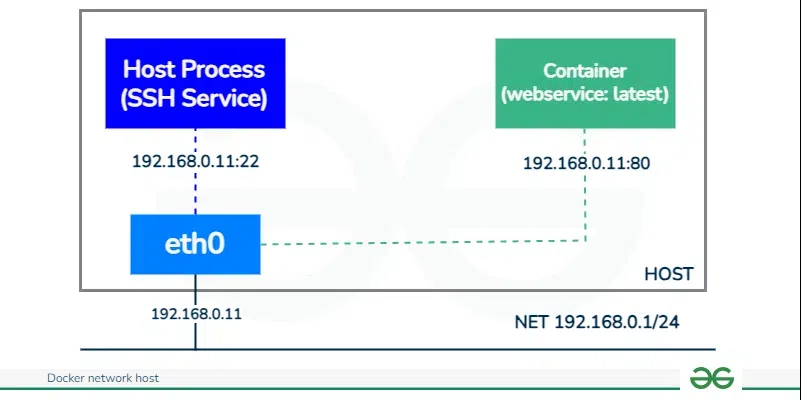What Is Docker Network Host ?
Last Updated :
16 Feb, 2024
Docker is a platform as a service for deploying programs in Docker bins. Containers are software “programs” that bundle together a utility’s supply code with its libraries, configurations, and dependencies, helping software programs run extra continuously and reliably on exceptional machines.
To begin using Docker containers, you need to be acquainted with Docker networking. Below, we’ll answer the question, “What is a Docker network host?”.
Schedule a demo to see how MetricFire permits you to display your Docker network. Sign up for a MetricFire unfastened trial!

What is Docker Network Host?
In Docker, a host is a machine that manages to run one or more containers. A Docker network host, also known as Docker host networking, is a networking method in which a Docker container shares its network namespace with a host machine.
The application inside the container can be accessed using a port at the host’s IP address (e.g., port 80).
Below is an example Docker command to run a container in host networking mode:
docker run -it --name web2 --net=host vaibhavthakur/docker:webinstance2
What are the Use Cases of Docker Network Host?
Why would you use Docker host networking mode? A Docker network host can provide performance improvements and better performance over other Docker network options, e.g., “none” and “bridge” options. Additionally, Docker host networking does not require network address translation (NAT), making it easy to use multiple ports at the same time. However, users working in Docker host networking mode should be careful to avoid port conflicts.
Conclusion:
Docker host networking provides an efficient choice for high utilization time with overall performance and ease of use being important. Understanding when using host networking and knowing the context is important to make informed choices in container environments By properly weighing benefits and flexibility, architects and operators can effectively use host networks to their Docker-based programs quite well.
Docker network host – FAQ’s:
How does host networking impact container isolation?
Host networking mode reduces the network separation between the container and the host. Unlike a bridge network, where containers have their own network, containers using a host network share the same network namespace as the host. This may mean safety and may not be suitable for sites that require strict separation between containers.
Can multiple containers use host networking simultaneously?
No, any container host using host networking mode has direct access to the network stack, and port conflicts can occur if multiple containers try to bind to the same port on the host Host networking ensures no port conflicts does not exist when running containers Let’s do it.
Are there any specific security considerations when using host networking mode?
- Using host networking mode can expose packing containers to security risks, on the grounds that they proportion the internet namespace with the host.
- It’s vital to ensure that a containerized utility is secure, observe high-quality practices for box protection, and pay near attention to whether or not host networking is necessary on your use case.
Can I use Docker Compose with host networking?
- Docker Compose does not directly support the –network host option. If you want to use the host network with Docker Compose, you can configure the services to use the host network in the docker-compose.yml file.
- However, keep in mind that not all features of Docker Compose can work well with host networking, and experimentation is recommended.
What is Docker host networking mode, and how does it differ from other networking modes?
- Docker host networking mode is a networking option that lets in bins to share a community namespace with the host working gadget. In this mode, the container makes use of the host’s network immediately, eliminating the modern community abstraction layer within the default bridge mode.
- Unlike bridge mode, wherein each container receives its very own community, host networking gives direct get admission to to host community interfaces, ports and services
Share your thoughts in the comments
Please Login to comment...